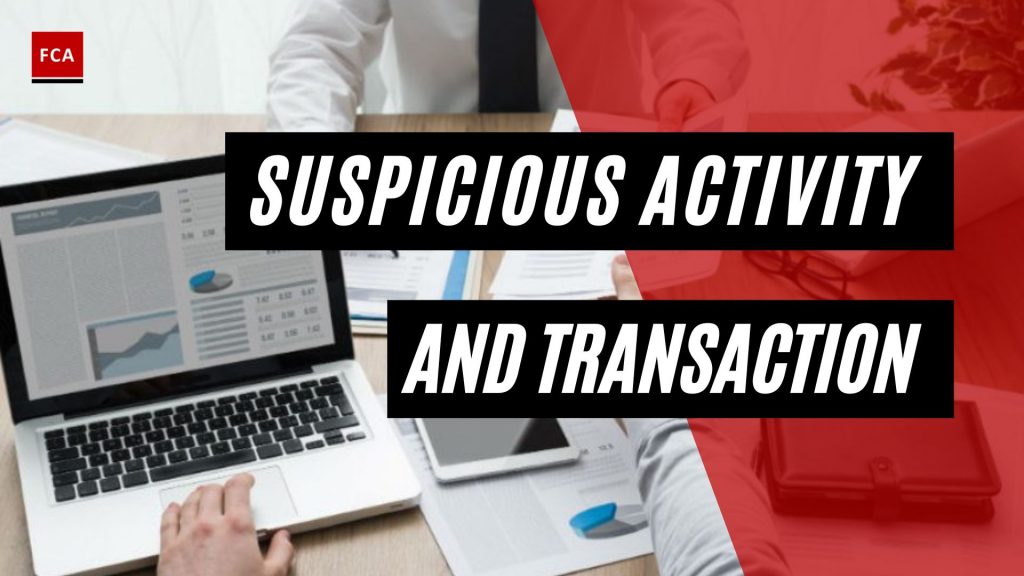Suspicious activity and transaction. Suspicious activity is any activity that has no apparent business or economic purpose or may be abnormal considering the customer’s risk profile or person. Money laundering methods and techniques change in response to developing counter-measures.

Suspicious Activity And Transaction
A suspicious transaction is a transaction that causes a reporting entity to have a feeling of apprehension or mistrust about the transaction considering its unusual nature or circumstances or the person or group of persons involved in the transaction.
All the activities and transactions that fall outside the expected employee and customer activity should be generated as a “red flag” or “alert,” for review and investigation by the ABC officer, in coordination with other relevant staff of the organization.
Suspicious Transaction Report
A Suspicious Transaction Report (STR) followed by an investigation must be filed with the regulator whenever a suspected case is identified as bribery and corruption. The Financial Action Task Force (FATF) has noted increasingly sophisticated combinations of techniques, such as the increased use of legal persons to disguise the true ownership and control of illegal proceeds and increased use of professionals to provide advice and assistance in criminal laundering funds.
These factors, combined with the experience gained through the FATF’s Non-Cooperative Countries and Territories process, and several national and international initiatives, led the FATF to review and revise the Forty Recommendations into a new comprehensive framework for combating money laundering and terrorist financing. The FATF now calls upon all countries to take the necessary steps to bring their national systems for combating money laundering and terrorist financing into compliance with the new FATF Recommendations and to effectively implement these measures.
Factors For Suspicion
Below are some factors which may bring about suspicion or reasonable doubt regarding suspicious activities or transactions:
- Unusual patterns of transactions which have no apparent economic or visible lawful purpose;
- Use of false documents to open an account;
- • inability, failure, or reluctance of a customer/ client to provide necessary due diligence information;
- Account activity or income inconsistent with the customer’s profile;
- Unusually large numbers /volumes of wire transfers or repetitive wire transfer patterns inconsistent with normal activity,
A transaction or activity where there is suspicion or reasonable grounds to believe the occurrence of a money laundering offense may include the bribery and corruption risks; therefore, when a transaction or activity is deemed suspicious, it is important that the ABC officer put into context other factors of assessing such suspicion and related risks.
Activities And Transactions
Activities and transactions may be evaluated as to whether they seem proper at the time and within the normal business operations and activities, the general knowledge of the customer, patterns and volumes of transactions, previous transaction patterns, and related possible connections to the accounts or customers. Other areas of significance in the assessment of money laundering and corruption suspicion may include factors based on the knowledge of the customer, financial history, and background.
Reasonable grounds or suspicion depend on the internal compliance regime, assessment, evaluation, due diligence information, and customer risk profile.
Where the organization cannot identify the customers, it should not open the account, commence business relations, or perform the transaction with the persons. The organization should terminate the business relationship with existing customers when suspicious transactions or activities are identified, including bribery and corruption activities and should consider making a suspicious transactions report about the customer.
Filing Reports
Filing reports of suspicious activity or transactions to the Financial Intelligence Agency (FIA) is important in combating money laundering and terrorist financing. If a financial institution suspects or has reasonable grounds to suspect that funds are the proceeds of criminal activity or are related to terrorist financing, it should be required, directly by law or regulation, to report its suspicions promptly to the financial intelligence unit (FIU).
The organization must establish guidelines and provide feedback that will assist in applying control measures to combat money laundering and corruption, and in particular, in detecting and reporting suspicious transactions and activities.
Final Thoughts
A suspicious transaction is one that causes a reporting entity to be concerned or suspicious about the transaction due to its unusual nature or circumstances, or the person or group of people involved in the transaction. To identify changes in the respondent’s transaction risk profile, reporting entities assess suspicion using a risk-based approach for customer due diligence, real-time payment screening, transaction monitoring, and behavioral monitoring.








